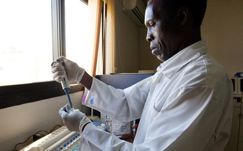Boost for African medical innovation
A R370-million partnership to develop new medicines, vaccines and other technologies
against HIV/AIDS, TB and malaria was announced last week by the South African
Medical Research Council and the University of Cape Town.
The funding and support partners are the Bill and Melinda Gates Foundation and the
Department of Science and Technology and the Department of Health.
The partnership brings together government, academia, industry to work towards drug
and vaccine discovery. Led by South African scientists, the partnership will aim to
harnesses the collective skills and research networks in and outside South Africa to
deliver life-saving benefits.
Collectively HIV/AIDS, TB and malaria not only contribute to Africa's high disease
burden, but also the world's.
"Africa's population is set to double by 2050, and Africa needs to start discovering and
developing medicines for its own people," says Professor Kelly Chibale, founder and
director of
UCT's Drug Discovery and Development Centre (H3-D).
Two programmes
The multi-year partnerships will support two distinct programmes:
In the first programme, researchers from across South Africa will compete for funding
from the MRC's Strategic Health Innovation Partnerships (SHIP) earmarked for the
development of AIDS and TB vaccines.
This initiative has received $11.7-million (about R125-million) from the Bill and
Melinda Gates Foundation, R130-million from the Department of Science and
Technology, and R60-million from the Department of Health.
SHIP's role will be to build on the scientific leadership of South African scientists in
these diseases and establish, fund and manage research programmes on innovative
products and approaches to prevent AIDS and TB.
The second programme will enable UCT's Drug Discovery and Development Centre
(H3-D) to build on its experiences and track record in integrated modern drug
discovery and preclinical development to the develop novel clinical drug candidtes to
address TB and malaria challenges.
In addition to R50-million funding from SHIP and the Technology Innovation Agency,
H3-D will receive $5 million (about R55-million) from the Bill and Melinda Gates
Foundation over five years.
African science solutions
The partnerships also aim to fulfil the longer-term goal to develop a critical mass of
top-flight South African scientists in the field, able to compete at high international
levels.
"We believe our partnering with the Bill and Melinda Gates Foundation, the MRC and
government helps us develop Africa-generated solutions to African problems,"
Professor Thandabantu Nhlapo, UCT's acting vice-chancellor, said at the MRC offices in
Tygerberg outside Cape Town last week.
He said that UCT's HD-3 showed that research not only created new knowledge but
new jobs, career opportunities, and
infrastructure - and reversed the brain drain.
"It's exciting to come and work in Africa," he said.
Dr Trevor Mundel, president of the Gates Foundation's Global Health Programme, said
the partnerships had enormous potential to tackle the tough challenges and support
those most in need in South Africa and across the continent.
"South Africa has world-class researchers and the infrastructure necessary to develop
the kinds of innovative health solutions needed to accelerate progress against TB,
HIV, malaria and other infectious diseases," he said.
Edited version of a story first published in UCT's Monday
Monthly. Published here with kind permission.
 A doctor tests blood samples at a hospital laboratory in Lusaka, Zambia (Photo: Gates Foundation)
A doctor tests blood samples at a hospital laboratory in Lusaka, Zambia (Photo: Gates Foundation)


